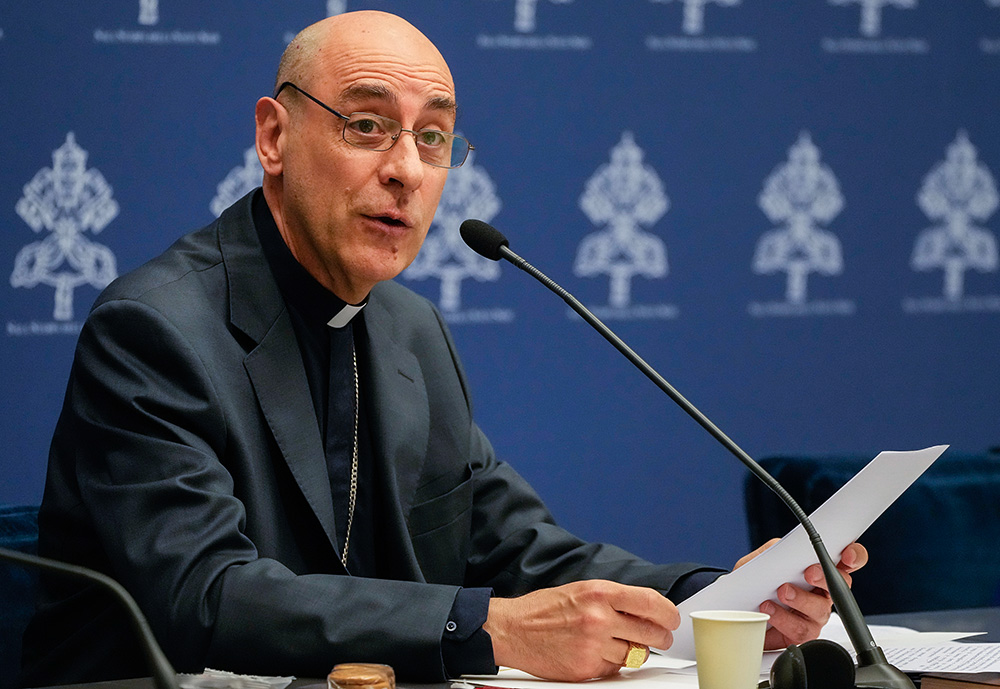
The prefect of the Vatican's Dicastery for the Doctrine of the Faith, Cardinal Víctor Manuel Fernández, presents the declaration Dignitas Infinita during a news conference at the Vatican April 8. (RNS/AP/Gregorio Borgia)
Two things struck me while reading Dignitas Infinita or "Infinite Dignity," the new declaration on surrogacy, gender and life from the Vatican released April 8 by the Dicastery for the Doctrine of the Faith.
For one, the document sets a new standard for transparency about how it was written, and, second, it goes to lengths to impress on its readers how long the church has taught on these topics.
The document, which applies church teaching to current threats to human dignity, makes clear that human dignity does not depend on wealth, intelligence, social status or abilities, but on the intrinsic worth of every human being.
Usually, declarations about such things come out of the Vatican as if from the mind of God. "Infinite Dignity" acknowledges its bumpy five-year gestation, which included an "unsatisfactory" 2019 draft and a completely new draft in 2021. That draft itself had to be shortened and simplified at the request of the congregation, or committee, of cardinals and bishops overseeing the doctrine office.
The dicastery approved the updated version in 2023, but Pope Francis "asked that the document highlight topics closely connected to the theme of dignity, such as poverty, the situation of migrants, violence against women, human trafficking, war, and other themes."
"A new and significantly modified version" was approved earlier this year, accepted by the pope and finally released this week.
Normally, these are facts journalists get through confidential sources. This time, the dicastery's prefect, Cardinal Víctor Manuel Fernández, laid it out in the document itself. The only thing he does not tell us is the names of those who wrote the document.
Fernández also clearly wanted to show that the declaration is consistent with the church's long history of teaching on human dignity. I confess I did not have the energy to count, but my guess is that about half the document comprises quotes from earlier church documents.
The actual document is divided into four sections. The initial three sections recall fundamental principles and theoretical premises for the term "dignity." The fourth section presents some current and problematic situations in which the immense and inalienable dignity due to every human being is not sufficiently recognized.
Dignitas Infinita grounds human dignity in both reason and revelation. It cites the Bible and the United Nations' Universal Declaration of Human Rights, classical philosophers and fathers of the church, secular thinkers and popes. All this results in 116 footnotes.
The dignity of every human being can be understood as "infinite," says the document, citing St. John Paul II. "He said this to show how human dignity transcends all outward appearances and specific aspects of people's lives," it says. This is "a universal truth that we are all called to recognize as a fundamental condition for our societies to be truly just, peaceful, healthy, and authentically human."
Francis, in his 2020 encyclical Fratelli Tutti, the declaration notes, "wanted to underscore that this dignity exists 'beyond all circumstances.' With this, he summoned all people to defend human dignity in every cultural context and every moment of human existence, regardless of physical, psychological, social, or even moral deficiencies."
A person's dignity is "inalienably grounded in his or her very being, which prevails in and beyond every circumstance, state, or situation the person may ever encounter."
Such a view, counter to the moral relativism of some philosophers, does not see human dignity or human rights as culturally determined.
Advertisement
What will interest most readers is the last section, which looks at some of the "grave violations of human dignity" of our world: poverty, war, migration, human trafficking, sexual abuse, violence against women, abortion, surrogacy, euthanasia, marginalization of people with disabilities, gender theory, sex change and digital violence.
While it's the last three that will likely get the headlines, Dignitas Infinita focuses on inequality of means. Quoting John Paul, it states, "One of the greatest injustices in the contemporary world consists precisely in this: that the ones who possess much are relatively few and those who possess almost nothing are many. It is the injustice of the poor distribution of the goods and services originally intended for all."
"If some people are born into a country or family where they have fewer opportunities to develop," says the new document, "we should acknowledge that this is contrary to their dignity, which is the same dignity as that of those born into a wealthy family or country. We are all responsible for this stark inequality, albeit to varying degrees."
With another quote from John Paul, the declaration says, "There is an urgent need to achieve real equality in every area: equal pay for equal work, protection for working mothers, fairness in career advancements, equality of spouses with regard to family rights and the recognition of everything that is part of the rights and duties of citizens in a democratic State."
"Inequalities in these areas are also various forms of violence," says the document.
In addressing abortion, the declaration, this time quoting Francis, says, "The dignity of every human being has an intrinsic character and is valid from the moment of conception until natural death."
Surrogacy, when women bear a child for another person, often for pay, is "a grave violation of the dignity of the woman and the child," the declaration says. I doubt that Americans who practice it will see it that way, but there is no denying that some women are forced into being surrogate mothers because of poverty.
While the document condemns euthanasia and assisted suicide, it supports pain relief, palliative care and avoiding aggressive treatments or disproportionate medical procedures.
Gender theory and sex change were the most eagerly anticipated topics of the declaration. It begins by reaffirming Francis' teaching in Amoris Laetitia that "every person, regardless of sexual orientation, ought to be respected in his or her dignity and treated with consideration, while 'every sign of unjust discrimination' is to be carefully avoided, particularly any form of aggression and violence."
However, Dignitas Infinita repeats Francis' concern that gender theory is "extremely dangerous since it cancels differences in its claim to make everyone equal." It also leads to "instances of ideological colonization," where the views of Europe and the United States are imposed on others.
Again, quoting Francis, this ideology "envisages a society without sexual differences, thereby eliminating the anthropological basis of the family. ... It needs to be emphasized that 'biological sex and the socio-cultural role of sex (gender) can be distinguished but not separated.'"
His critics would respond that some experience a gender different from their biological sex. They do not choose this; they are born that way.
The document also opposes sex change, which "risks threatening the unique dignity the person has received from the moment of conception."
On the other hand, the document does permit the assistance of health care professionals in dealing with "genital abnormalities."
While acknowledging that digital technologies can promote human dignity, the declaration spends most of its time warning of the possibilities of fake news, slander, cyberbullying, loneliness, manipulation, exploitation, violence and "the risk of addiction, isolation, and gradual loss of contact with concrete reality, blocking the development of authentic interpersonal relationships."
Though it will probably not convince anyone who disagrees with church teaching, Dignitas Infinita is an excellent summary of papal teaching on the topics addressed. I only wish that the declaration, showing a little ecclesial humility and contrition, had acknowledged the goodwill of those who disagree, and encouraged dialogue.
In addition, it is a bit much to say that "from the start of her mission and propelled by the Gospel, the Church has striven to affirm human freedom and promote the rights of all people."
There are too many historical examples of church authorities siding with the powerful against the weak, ignoring the rights of Indigenous people and violating religious freedom of non-Catholics. For that we should repent.
Otherwise, Dignitas Infinita is a faithful summary of church teaching.






